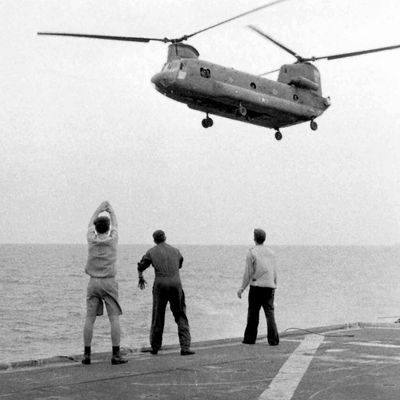
In Rory Kennedy’s spectacularly moving documentary Last Days in Vietnam we see how, in late April, 1975, when the North Vietnamese made their swift and inexorable descent on the south, there was no organized plan for the evacuation of Saigon—of Americans or their South Vietnamese allies. It was the ultimate betrayal.
We also hear how many Americans improvised furiously on that last terrible day — heroes, people who embodied our country’s noblest values and still writhe with guilt over the Vietnamese whom they were not able to evacuate.
Finally, astonishingly, we see how one man, the U.S. ambassador Graham Martin, represented the worst and best of the Vietnam debacle. He was both a tragic fool and a brave and resolute leader. He was … is … impossible to hate — unlike, say, the unindicted war criminal Henry Kissinger, who’s on hand to deliver his standard lugubrious drivel on the subject of his and Gerald Ford’s deep pain at not being able to convince Congress to give them more money to save their allies (or, he doesn’t add, their face).
In sum, Last Days is the best kind of doc — it ties you up in knots.
There is plenty of evocative footage from the time, and Kennedy — a Kennedy — has found a goodly number of participants to testify to U.S. thinking, or lack thereof. Her subjects cite two theses for what went wrong (apart from the whole ungodly war itself). The first is that the North Vietnamese thought Richard Nixon was a psychopath who’d relaunch the war (or nuke them) if they broke the Paris Peace (“with Honor”) Accord — a fear that flew out the window in August of ’74 when he was replaced by the apparent milquetoast Ford.
The second is that Ambassador Martin — so emotionally invested in a war that killed his only son — refused to accept the abundant evidence that Saigon would soon be overrun. We learn from sundry U.S. government operatives that there were four possible means of evacuation and that the first three — commercial airlines, military airlines, big frigging ships to the South China Sea — would have been relatively easy to implement. But Martin said the fears of losing Saigon were unfounded, and the last thing he wanted was a panic. Those who knew he was wrong operated in secret, under the radar — black ops by men in white hats. But they had limited resources. By the time the North Vietnamese were bombing the airport on the outskirts of Saigon, the only option was the fourth: helicopters from the American embassy. You’ve seen them in news footage, lifting off while clinging human-monkey chains disintegrate beneath them.
The cue for evacuation was the phrase over the loudspeakers, “It’s 105 and rising,” followed by Bing Crosby singing, “I’m dreaming … of a white Christmas … ” Kennedy plays the song as they probably heard it at the time, somewhat crackly, evoking — incidentally — the first time it was taken to heart, by Americans stationed overseas in World War II.
The ambassador didn’t jump on the chopper that came for him specifically before anyone else. He put other people on it — it’s estimated one American for every ten Vietnamese. He probably would have gone down with the metaphorical ship if the U.S. hadn’t ordered him finally, near the end, to leave for one of the carriers standing off the coast. Meanwhile, on a ship overrun by refugees, the American servicemen spent all their money at the canteen to feed and clothe their exhausted guests.
The last section features testaments from marine pilots who made scores of trips, hour after hour, with no sleep, back and forth from the embassy. Also on hand to recall the scene are Vietnamese who made it over the wall and onto helicopters. One, a boy at the time, still hears the rumbling of Chinooks. Surprisingly, we meet a man who didn’t get away and is still alive. It’s surprising because the North Vietnamese showed little mercy for their opponents, even those who surrendered unconditionally, without a fight.
In one of the more reflective moments in Last Days in Vietnam, an ex-CIA operative describes himself as “the quintessential American in Vietnam” — someone who forgot that “what was at stake were human lives,” someone guilty of a deep and serious betrayal of trust. “Promises made in good faith … promises broken … ” says one witness to the last days of Vietnam.
Apart from illuminating an episode about which most of us knew little, Kennedy reminds us of our legacy in some (not all) parts of the world. After Saigon, we were the country whose president, George H.W. Bush, urged the Kurds to rise up against Saddam Hussein and then abandoned them to be murdered in huge numbers. We were the country whose president, George W. Bush, invaded the same country with no clue how to run it once its government fell — again taking little responsibility for those who risked everything to side with us.
In Saigon in April of 1975, there was no shortage of good people who rose to the occasion. But how much could they have done when the men at the top were at best incompetent and at worst criminally indifferent? It gives new meaning to the phrase “American exceptionalism.”


